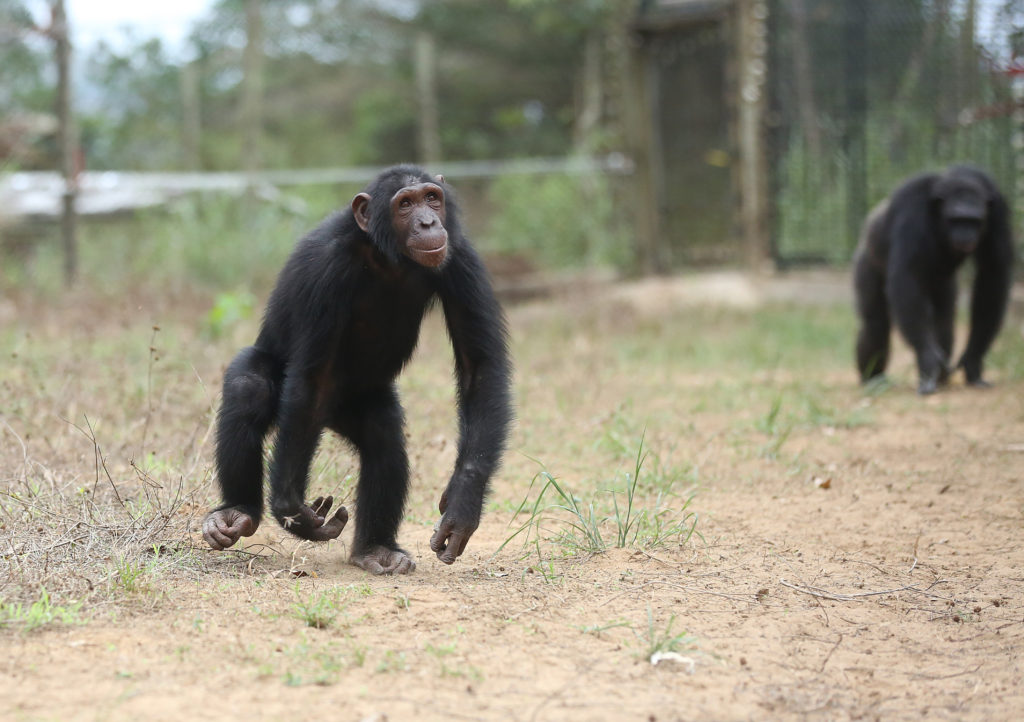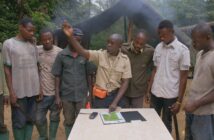Cardiovascular disease is one of the leading causes of death in the United States, and so like many things related to human health, looking to our closest living relatives can provide some important insights. In fact, a recent study which included our own JGI staff in Republic of the Congo, found that chimpanzees in rehabilitation centers had low body weights and lower levels of fatty acids, which decreases their risk for cardiovascular diseases. By analyzing lifestyle and other factors that relate to heart health in sanctuary chimpanzees, we can learn more about how to best care for captive wildlife, and humans alike!
This study, performed in conjunction with researchers at the University of Michigan, University of New Mexico, researchers in Uganda, and our own JGI staff at Tchimpounga Chimpanzee Rehabilitation Center in Congo, evaluated certain lifestyle factors in chimpanzees and their correlation with heart health. Researchers monitored chimpanzees who live in rehabilitation centers, which allow them to roam semi-free range better reflecting conditions like what they would experience living in the wild.
Factors such as fatty acid levels, body weight, and body fat were observed in 75 chimpanzees at a rehabilitation center. This data was compared with other studies that focused on chimpanzee heart health. Previously, the only data collected on chimpanzee heart health was from populations that lived in laboratory settings, and thus experienced very different conditions than those who lived in sanctuaries. For example, chimpanzees in laboratory settings have less space to move about, and often consume diets composed of processed foods.

Research on these laboratory populations of chimpanzees showed that they had levels of fatty acids that increased their risk for cardiovascular disease. In contrast, chimpanzees who live in facilities that allow for free movement time and outdoor space had lower levels, decreasing their risk for cardiovascular disease even as they continued to age. These low levels are also due in part to the plant-based, natural diet that these sanctuary chimpanzees consume, as well as having ample space that allows them to exercise. Correlations could also be made based on socialization, as sanctuaries such as Tchimpounga intentionally use social integration techniques to ensure that rescued chimpanzees have companionship and communities with others. This is part of the larger Chimpanzee Welfare Index (CWI) protocols, an Index developed at by JGI’s Dr. Rebeca Atencia, which uses factors like physical and mental health to establish individualized care plans for each rescued chimpanzee. Through this work, every single rescued chimpanzee at Tchimpounga now has a CWI score of over 93% as of 2020.
This research shows the positive impacts of chimpanzee rehabilitation facilities such as the Tchimpounga Chimpanzee Rehabilitation Center, a sanctuary that provides refuge for orphaned, injured, or sick chimpanzees rescued from the illegal pet and/or bushmeat trades. Chimpanzees who live in these conditions, especially those with advanced welfare standards, are at lower risk for cardiovascular disease than their laboratory-dwelling counterparts. Hopefully, these practices can be used in all captive great ape environments to ensure the same healthful outcomes.
What does this mean for humans? This research on our closest living relatives contributes to understanding around our own lifestyles and health needs for both physical activity, outdoor space, socialization, and more natural diets. With more research of this kind, we can continue to provide best-in-class care for rescued great apes, and improve human wellbeing along the way.

The Jane Goodall Institute is a global community conservation organization that advances the vision and work of Dr. Jane Goodall. By protecting chimpanzees and inspiring people to conserve the natural world we all share, we improve the lives of people, animals and the environment. Everything is connected—everyone can make a difference.








